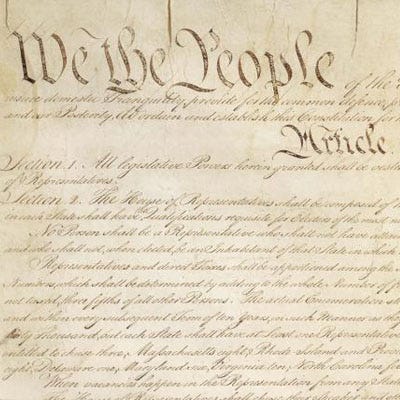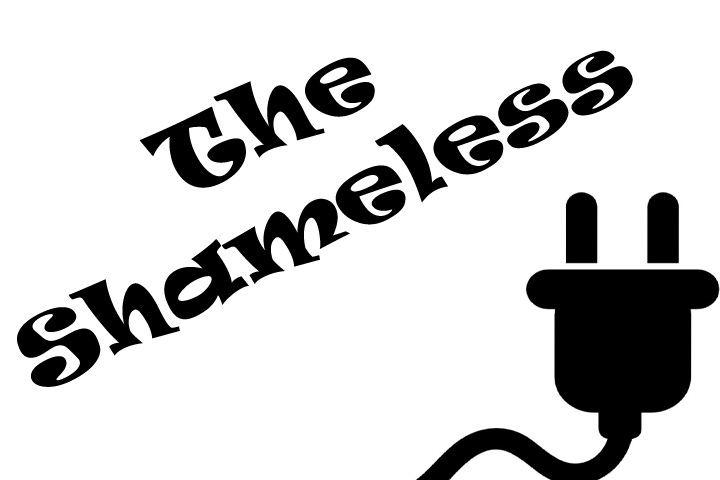Photo Credit: National Archives
Issue #352: Government June 29, 2023
Donald Trump may think he is the most brilliant president, but actually, he is the most corrupt president in American history, and we've had some doozies in the past.
He is the first president to be indicted twice, once on the state level and once on the federal level, the only president impeached twice, and the only president found legally liable for sexual assault.
He is also the only incumbent president who lost re-election and then worked against the peaceful transfer of power and then tried to stop the legal counting of the electoral college votes by encouraging his armed supporters to go to the Capitol to hurt and even kill members of Congress and the sitting vice president.
Trump, when he took the oath of office, pledged to uphold the Constitution, but he has tried many times to just shred many constitutional norms.
Now Trump, who suddenly declared himself a candidate after the classified documents were found at his Mar-a-Lago Country Club, is insisting that he is being persecuted by the Democrats because they are afraid of him becoming president again.
So he is so far continuing to run as an indicted regular citizen, even though he'll be spending a lot of time in court in between his political rallies.
So, how can a person under indictment run for president of the United States?
The foundation of our democracy rests upon the belief that all are equal before the law. This includes those who aspire to hold the highest office in our land, the presidency. Throughout history, there have been instances where individuals have sought this office while facing legal challenges.
One of the most notable examples is Vice President Spiro Agnew, who was under investigation for tax evasion and money laundering during his tenure under President Nixon. While he was not running for president, Agnew eventually resigned before any formal charges were filed.
There is no constitutional provision or federal law that explicitly prevents someone under indictment from seeking the presidency. However, the candidate would face significant legal and political hurdles. The court proceedings could distract from the campaign, and the stigma associated with criminal charges could sway public opinion.
Of course, at least for Republicans who may vote in the primaries, every time Trump is indicted, his popularity numbers go up. What does that say about the Republican party?
“We Are Speaking,” through we publish seven days a week, is financially supported by our paid subscribers and by investments in the products and services offered by the Global Creative Community Branding and Marketing Academy. Please make sure to view and act on the important information at the end of this article to help support “We Are Speaking.” Thank you!
Legally, we are in uncharted territory. The U.S. Constitution does not address this specific situation. It only states that the President must be a natural-born citizen, at least 35 years old, and have lived in the United States for at least 14 years. Therefore, an individual under indictment could technically run for and be elected to the presidency.
What happens if a presidential candidate is convicted?
Now, let's examine the scenario where a candidate gets convicted after the election but before the inauguration. The 20th Amendment states that if the President-elect fails to qualify by Inauguration Day, the Vice President-elect becomes acting president until the President-elect qualifies. If the President-elect is convicted and sentenced, this could potentially disqualify them from taking office, leading to a constitutional crisis of unprecedented scale.
In terms of political strategy, candidates in this situation would likely focus on maintaining their innocence and highlighting the flaws in the indictment process. They might argue that the charges are politically motivated, aiming to garner sympathy and support from their base.
Trump is counting on winning the 2024 presidential race and then pardoning himself if he is convicted. A president has never tried to pardon himself, either.
Finally, what does this mean for our democratic process? It highlights the importance of transparency, accountability, and the rule of law. It underscores the need for rigorous vetting and ethical standards for candidates seeking the highest office. It also raises questions about the balance of power, the role of the judiciary, and the resilience of our democratic institutions.
In conclusion, running for the presidency while under indictment presents a complex interplay of legal, political, and societal factors. While our Constitution and laws do not explicitly forbid such a scenario, it tests the boundaries of our democratic norms and values.
Just like we and American democracy, in general, haven't experienced the ramifications of having a person like Donald Trump as the leader of the free world. We saw it before, and we cannot allow it to happen again.
Let us know your thoughts about what new information you learned in the comments or in the Substack Notes feature.
You can always leave any questions in the comments or email us.
This article is free to access for 7 days after publication. Please consider becoming a paid subscriber for $5/month or less to access all of the articles and other benefits.
This is your chance to support everything Keith and Pam do. We appreciate you!
Purchase and download your copy of the “Branding And Marketing For The Rest Of Us” eBook for Independent Authors and Creative and Solo Professionals and other valuable eBooks.
Enroll in one of the 6-course bundles designed especially for you: “Author and Book Marketing” and/or “Essential Creative Marketing.”
Purchase your copies of “Detroit Stories Quarterly” issues.
Purchase your copies of “The Mayonnaise Murders” Parts 1, 2, and 3
What else do Keith and Pam do?
Where else can you find us?
Click the link below to learn everything you need to know and review everything we offer for independent writers and creative and solo professionals.







